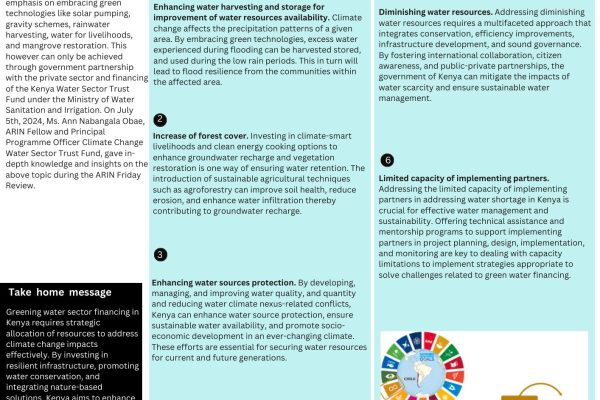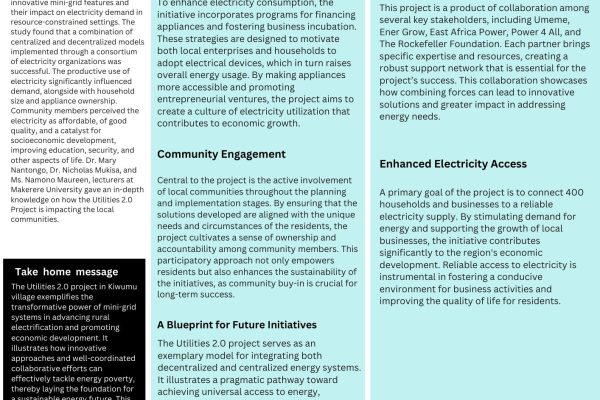Introduction.
Climate change is a mounting threat to public health in Africa, exacerbating existing vulnerabilities and imposing new challenges on the health systems. The Intergovernmental Panel on Climate Change (IPCC, 2022) underscores the continent’s high susceptibility to climate-related health impacts, including the surge in vector-borne diseases, water scarcity, and food insecurity. These challenges disproportionately affect vulnerable populations. For instance, cholera, and malaria outbreaks linked to climate fluctuations exemplify the intricate relationship between climate and health. This review delved into existing funding mechanisms supporting climate and health research in Africa, gaps and challenges within the current funding landscape, presented by Mr. Maanzou Boukari, ARIN Fellow on August 16, 2024.
Key Messages.
Limited Funding
The challenge of limited funding is a significant barrier to advancing climate-health research in Africa. Traditional funding avenues, such as government grants and philanthropic contributions, often fall short of what is necessary to address the escalating demands placed on this vital area of study. The complexities inherent in climate health research—characterized by interdisciplinary collaborations that integrate environmental science, public health, and socioeconomic factors—require substantial financial resources and meticulous management. This multifaceted nature of the projects further complicates the effort to secure adequate funding, leading to difficulties in both project execution and overall impact.
Lack of Awareness
Another major obstacle is the widespread lack of awareness among potential funding sources regarding the critical relationship between climate change and public health in the African context. Many funders may be unaware of how detrimental climate shifts can affect health outcomes, particularly for the most vulnerable communities. This gap in understanding can result in a dearth of financial support for impactful research initiatives. Thus, enhancing awareness about the significance of climate-health research among these stakeholders is crucial. Through targeted outreach and education, potential funders can be informed about the pressing need for investment in this field, paving the way for increased financial backing.
Regulatory Barriers
The regulatory environment can also pose significant challenges, with bureaucratic hurdles often delaying the approval and implementation of innovative financing strategies for climate-health endeavors. Such obstacles can deter researchers and organizations from pursuing essential projects due to the intricate web of procedures involved. To facilitate more effective funding mechanisms, there is a need for governments to establish streamlined processes for the approval of climate-health initiatives. This could entail simplifying the steps involved and minimizing the number of agencies participating in the approval process, thereby accelerating project timelines and enabling quicker access to necessary funds.
International Collaboration
A promising avenue for addressing funding shortcomings lies in fostering partnerships with international organizations, development banks, and various stakeholders. Such collaborations can not only provide financial assistance but also offer valuable technical expertise, enhancing the capacity to implement high-impact research projects. By engaging in these international partnerships, local researchers and organizations can tap into a broader pool of resources and knowledge that can fuel more effective responses to climate-related health challenges.
Innovative Financial Instruments
Exploring and leveraging innovative financial instruments is another key strategy for enhancing funding for climate-health research. Mechanisms such as climate adaptation funds, resilience bonds, and social impact investments can serve as vital sources of capital directed toward projects that address the intricate interlinkages between climate change and public health. By mobilizing investments in these areas, we can ensure that adequate resources are allocated to initiatives designed to bolster community resilience and improve public health outcomes in the face of climate change.
Conclusion
Achieving a just energy transition extends beyond merely decreasing carbon emissions; it encompasses the broader goal of fostering sustainable economic growth, promoting social equity, and ensuring environmental preservation. By actively investing in renewable energy sources, Sub-Saharan Africa holds the potential to dramatically reshape its energy landscape, enhance the well-being of its populations, and contribute meaningfully to global climate change mitigation efforts. Embracing this transition is vital not only for the region’s development but also for its future resilience in confronting the myriad challenges posed by climate change.




